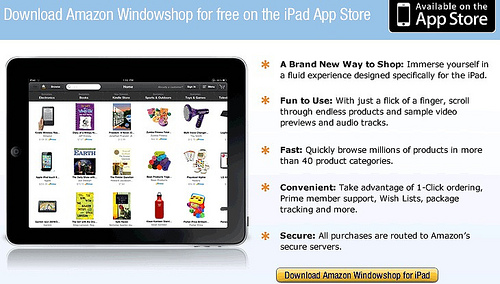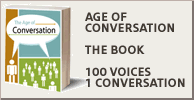


"Yes, we don't have the layers of management approval! We don't pass things up and down the chain. The team working on the product development makes the decisions. If there's a problem or if they think it merits it then they will talk to Mark [Zuckerberg] directly. We try to do a good job of setting out the context of the task and release people to get on and do it. People are pushing new features and code to the site every day. It's really about trying to remove barriers and reduce friction in development."
Mike Schroepfer- VP Engineering, Facebook (from an interview in The Guardian)
Posted by Ed Cotton

A recent post on Influx about agency labs generated a lot of conversation and debate, so it’s only fair that I sum up the discussion and try to make sense of it.
At its heart it’s all about innovation in agency land and who takes responsibility for it.
There were a number of comments highlighting the danger of agency skunk works that are isolated from their main units and can often be ineffective.
Bud Caddell summed these thoughts up nicely.
“Agencies don't need labs. Agencies need to become labs. From an evolutionary biology perspective, the agency ecosystem is in turbulence, and these organisms (the agencies) need to adapt as quickly as possible to achieve fitness in the new landscape. While having a lab may seem to satisfy that condition - by integrating mutation, crossover, and ultimately novelty into the larger organism, the challenge of spreading the lab's practices and success to the larger organization is a huge hurdle - one that organizations almost always fail at.”
However, there were a couple of thoughts that were supportive of labs for different reasons.
Matt Albiniak the justification for labs was based on the need for deep technological understanding.
“Unfortunately, it's rare to find people that understand guts of an API spec and can apply that to a brand identity, or map it consumer behavior. Labs are absolutely necessary. They always have been. They've just never worked because not everyone knows how to share the information in meaningful and useful ways. I've seen a couple agencies figure it out, but it's mostly due to finding those rare people that a) understand the technology and b) have the people skills to share it.”
For Robin Lanahan the need for a lab was based on the lack of bandwidth and dedication to the topic.
“The big agencies have big clients and big daily challenges and are often housed in big spaces not providing the right conditions for innovation. Having worked in the agencies that acted like labs in the early days (Wieden and Crispin), I know it's possible. But in this day, commitment to innovation requires resources and people that can be dedicated.”
Mel Exon of BBH Labs took on the challenge of the lack of influence and accountability directly.
The difference with Labs is that experimentation and the transfer of learning IS the day job, it's all we do. The role of Labs here boils down to two things, I think - 1. Reducing complexity (new stuff can look and feel labyrinthine at the outset, it helps to have a few scouts) and 2. Accelerating the transfer of knowledge (to extend the metaphor, the scouts need to carry a ball of wool). What this hopefully sheds light on is the fact that we have enough fluidity and external focus to bring new approaches to bear, but that our relationship with the rest of the agency is a close, symbiotic one. To be successful, it has to be.
Based on these comments and the debate overall, it’s clear what agencies need to do.
No one is debating the need for innovation; it seems like a perquisite for the times, the only debate is how it’s done.
To embrace innovation, agencies need to do three things
1. Encourage and incentivize their employees to think and be innovative. This will need to be defined and made clear, but if breakthrough is the requirement, everyone needs to step up and take responsibility to help make it happen.
2. Hire technologists and add them to creative teams. No one can understand and the keep up with the complexities of evolving technology as a night job. There’s a need for someone who’s dedicated to doing this full time. This isn’t about someone who understands how to design and create user-experiences digitally, but a person who knows how an API or what’s inside the guts of a phone. Big digital agencies have them, their more traditional counterparts, don’t.
3. Set up a lab. These can scale from employees who are given a small % of their time to be the “lab” to a fully dedicated unit. Obviously, these options have different investment levels. The important thing about a “lab” is that it has a mission which is all about thinking two steps ahead of everyone else and it transfers this knowledge effectively throughout the agency.
If anyone is interested in turning this discussion into a live debate- maybe one evening in NYC with beers, etc- please let me know...
Posted by Ed Cotton

The missing link in the coming mobile revolution is the payments piece. Various people and players have been struggling for years to come up with a solution that works across handsets, networks and operating systems. Then there's the issue of security and making sure that everything works as planned.
Currently, Amazon and EBay have made huge strides in making mobile payments, not just a reality, but a highly lucrative part of their business models. Although, huge these two players represent a tiny fraction of the universe.
This could be about change thanks to a company called BOKU, who have just started participating in a trial with AT&T. The system can work across platforms and is very simple from the user perspective.
"The process for making a payment is simple and convenient - users simply click BOKU to purchase and then 1. Enter their mobile number, 2. Receive a text message to confirm, and 3. Reply with the letter “y.”
BOKU has certainly attracted a lot of attention, including- Apple's.
It remains to be seen if the company waits to seize the big prize of offering its services across networks and handsets or goes for a quick sale.
If it's the former, there's the potential of this new service to radically change the mobile advertising space. If there's a simple, easy-to-use payment method advertisers will have opportunities to sell direct and making the advertising market instantly viable.
Posted by Ed Cotton

Here's another good example of a huge brand creating an experience that fits the iPad.
Amazon is clearly keen to push itself into a number of channels and has already had massive success with mobile.
With its new iPad application, it demonstrates an understanding of "the lean back" experience by translating the Amazon experience into a "Window Shopping".
It creates a fantastic browsing experience that allows the user to move rapidly through items and complete transactions.
It's further proof that the iPad offers brands an opportunity to create an experience with users that's fundamentally different from a typical website. With the growth of the iPad, brands can't ignore this area of development.
Posted by Ed Cotton

There's nothing that makes people in marketing more nervous than handing over control to the consumer. The idea is that they (consumers) are supposed to listen obediently to everything they are told and like good "puppies" act only on that information. Of course, this is complete fantasy, but the mythology and illusion still perpetuate the mind of many a CMO, marketing dept and creative team.
When it comes to the interactive world, this attitude is the kiss of death. If you ask a people in user testing to just sit, watch and obey- they will either ask to see the "skip" button, or leave the room.
It's great to have good content, it's the thing that really matters, but you've got to let users into the sandbox to play and get out of that content exactly what they want. This defines a good user experiences vs. a "non" user experience.
A fantastic example of a great experience comes from conference maestros TED and their freshly minted iPad application. The app allows users to select one of TED's awesome talks based on duration and/or theme, also it can even organize playlists for based on big ideas.
You instantly can see that this solves the convenience and practicality problem right away and also has a nice level of play potential.
TED could have easily just put its videos up on a site
It shows how fat TED has moved from being an aloof, expensive gathering for millionaires to an opinion leading think tank, that provides inspiration for all and this iPad app proves it.
Now all we need is for all those marketing types to give up their fear of handing over control and great user experiences will abound.
Posted by Ed Cotton

For those looking for what's next in tech, Gartner's hype cycle chart is a fascinating source.
The latest chart interestingly places consumer generated media alongside public virtual worlds in its "Trough of Disillusionment". While we all know Second Life is no longer what it once was, but CGM seems still to have something of a pulse.
On the same chart, Gartner tells us somewhat surprisingly that e-book readers and microblogging are heading straight for the trough. Of course, this is often just a holding pen before these ideas emerge with momentum out into the Slope of Enlightenment.
Just emerging, according to Gartner, are brain-computer interfaces and human augmentation, which assumes one day we will all become the robots we fear.
Posted by Ed Cotton
